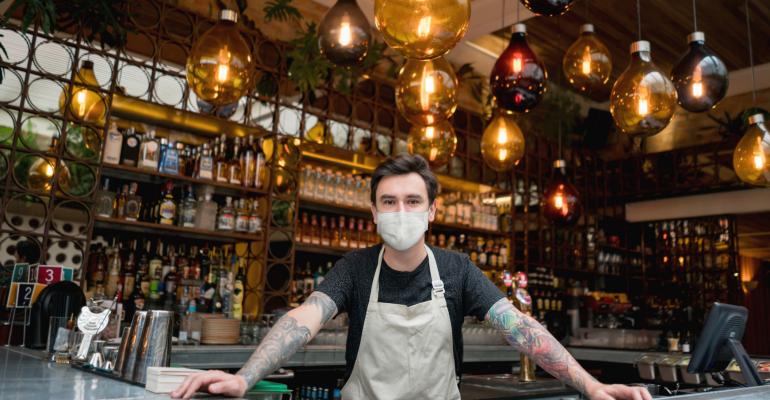Sponsored by Monin®
The pandemic has clobbered the beverage business in restaurants and bars. Fortunately, there are a number of opportunities operators can seize to regain their footing. Here are a few:
• Seasonality. As summer’s refreshing tropical libations bow out, familiar fall flavors like apple, pumpkin, cinnamon and maple reignite customer interest.
• Health and Wellness. Demand is rising for low- and no-alcohol beverages and drinks made with healthful and functional ingredients.
• Indulgence. Cocktail hour is a respite from anxious times.
• Libations to-go. Prepared cocktails, now legal for takeout sale in many places, appeal to homebound consumers and provide a welcome boost to operators.
Seasonality Reigns
Using seasonal ingredients is top-of-mind for a cocktail developer. “I’ll certainly be thinking about apples, cranberries and fall spices for the drink list,” says Travis Serbus, co-owner and bar director of Petite Leon, a restaurant with a menu influenced by global cuisines. Petite Leon is slated to open in Minneapolis this fall.
Yet as popular as the fall classics are, it would be a mistake to rule out the summery fruit flavors that precede them. “Even in the dead of winter, sometimes I want a daiquiri or a tiki drink that helps make me forget that it's cold out,” says Serbus.
As he plots the Petite Leon cocktail list, Serbus is exploring spirits such as mezcal, rhum agricole and “really funky” aged rums. “I like to experiment with oddball flavors, but in general I like to keep drinks simple,” says Serbus. “I don't want it to be too much work for my bartender.”
At the LondonHouse Chicago hotel, which reopened its 22nd floor rooftop terrace for cocktail service when coronavirus restrictions were eased, the bar is following a similar ethic. A tighter labor budget is accelerating a trend of simpler, easier-to-execute signature cocktails. “It’s not about piling on the ingredients,” says Adam Peabody, the hotel’s head mixologist. “It’s about making drinks with the best quality.”
Using a high-quality prepared syrup, puree or shrub in a drink, instead of laboriously prepping ingredients by hand, lets bartenders cut to the chase. Take the LondonHouse summer cocktail Beach Vibes, a medley of orange vodka, pineapple and natural passion fruit syrup. The latter delivers vivid flavor and “spares you the inconsistency that occurs with a fresh product,” Peabody says.
Looking to fall, Peabody foresees pomegranate, apple and cranberry, along with tea and coffee, appearing in specialty drinks. Also under consideration are preserved flavorings such as dried blueberries and strawberries. “That’s a way to bring summer ingredients into your fall menu while keeping them at peak freshness,” says Peabody.
Keeping It Better-for-You
The use of functional ingredients such as turmeric, ginger, antioxidants and probiotics in beverages is one of the major health-focused beverage trends reported by the market research firm Packaged Facts. Such products have been “jumping off the shelves as people look to stay healthy amid the coronavirus pandemic,” Packaged Facts says.
Health consciousness is also driving interest in low-alcohol and alcohol-free cocktails. “I think it’s a good time for us to focus on improving our health and immune systems, so I’ll be working on nonalcoholic drinks” says Serbus.
“Some beverage trends that existed pre-COVID-19 are alive and well, like the low-ABV (alcohol by volume) drinks that we're seeing a lot,” adds Peabody.
Crafting Cocktails to Go
There has been some good news for operators. Some states and cities have eased regulations against selling alcohol drinks for takeout, giving a profit lifeline to operators struggling with seating restrictions or dining-room closures. A few examples:
• At Virtue in Chicago, to-go choices include the Martini Kit, with a bottle of vodka, vermouth, olives and lemon, priced at $68, and Patience is a Virtue, a mixture of vodka, violet liqueur and lime, yielding two cocktails over ice, priced at $26.
• Snooze, an AM Eatery based in Denver touts the Big Mary Bloody kit, with two 375-milliliter bottles of vodka and a gallon of “our famous Bloody Mary mix,” and the Big Screwdriver Kit, with two vodkas and a gallon of orange juice. Each kit is priced at $45.
• Border Grill in downtown Los Angeles offers three bottled Margarita Kits for curbside pickup: Pequeno, which makes one to two margaritas, priced at $12, Mediano, which makes three to four margaritas, priced at $22, and Grande, which makes six to eight drinks, priced at $40.
In today’s uncertain climate, heeding changing consumer preferences is essential. Offering a beverage menu that balances seasonality, healthfulness and indulgence, along with on-trend flavors and ingredients, offers operators a path forward.





